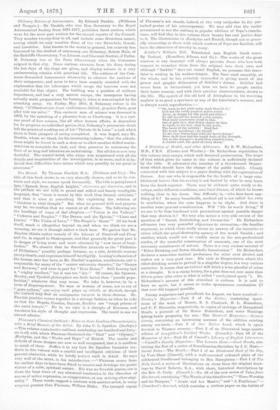Schiller's Wilhelm Tell. Translated into English blank verse. By Tarkari.
(Hamilton, Adams, and Co.)—The works of the great masters in any language will always provoke those who love both tongues to translate them from the original into their own, and although " Tarkari " does not sound English, we presume this trans- lator is writing in his mother-tongue. His linos read smoothly, on the whole, and he has certainly succeeded in giving much of the power and graphic delineation of Schillor's drama. Schiller had never been in Switzerland, yet here we have its people amidst their home scenery, and with their peculiar characteristics, drawn to the life. The speech of the old lord of Attinglutus to his wavering nephew is as good a specimen as any of the translator's manner, and is always worth reproduction :— " ' Oh, learn to feel what noble stock thou'rt of
Oast not the costly pearl of native worth Away, in change for idle gawd and glitter I
To call thyself the head of a free people,
That truly consecrates itself to thee Out of pure love, that firmly stands by thee In battle to the last; that be thy pride, The boast of thy nobility! Bind fast The bonds hereditary ; tie thyself To the dour Fatherland with thy heart•strings Here shalt thou find the tough roots of strength.
Out in the stranger's world thou stand, st alone, A slender reed, the sport of every storm."


































 Previous page
Previous page